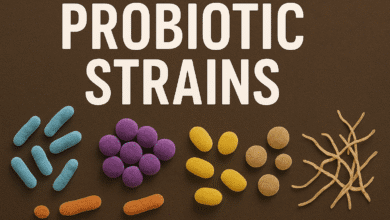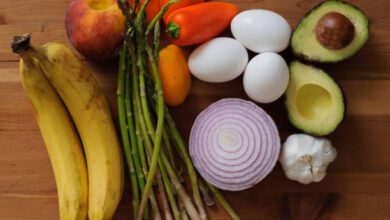Top Probiotic Picks: The Ultimate Guide to Strains, Foods & Targeted Benefits
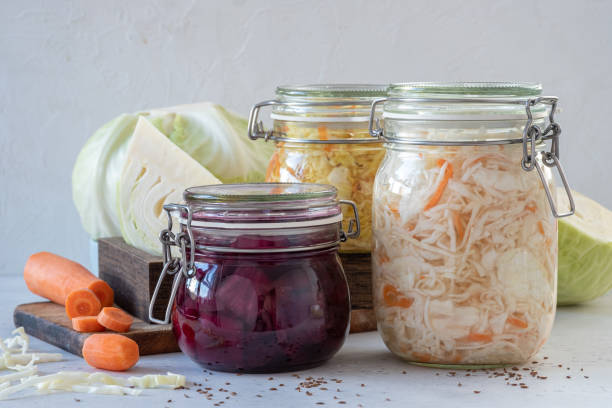
5 Best Probiotic Foods for Gut Health: Strains, Foods & Targeted Benefits
What Are People Asking About Probiotics?
Before we jump into the world of gut superheroes, let’s tackle the questions buzzing around about the best probiotic foods for gut health. From bloating to mental clarity, people want to know: What’s the deal with probiotics? Are they worth the hype? Here’s what’s trending:
- What are the best probiotic strains for gut health?
- How do I know if a probiotic is high-quality?
- Can probiotics help with bloating, IBS, or anxiety?
- Should I take probiotics with food?
- Are refrigerated probiotics better than shelf-stable ones?
We’ll answer all these with science-backed insights, a sprinkle of fun, and no boring jargon. Ready to make gut health your superpower? Let’s dive in!
Introduction: Your Gut’s Best Friends
Picture your gut as a bustling city—some residents keep the streets clean, while others start food fights. The best probiotic foods for gut health are like the city’s superheroes, swooping in to boost digestion, strengthen immunity, and even lift your mood. But with so many options, how do you pick the right ones?
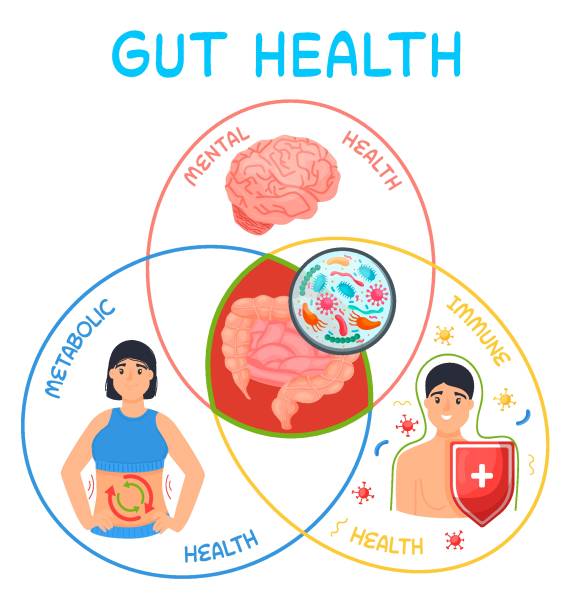
I learned this the hard way after a dodgy street taco in Mexico City left my gut in chaos. Years of researching (and taste-testing fermented foods from Tokyo’s natto stalls to Berlin’s sauerkraut markets) led me to the ultimate guide for the best probiotic foods for gut health. From kimchi to kefir, I’ve got you covered with strains, foods, and strategies for every age and lifestyle.
By the end, you’ll:
- ✅ Discover 5 probiotic foods that beat supplements (see our tasty table!).
- ✅ Learn which strains work best for kids, travelers, seniors, and more.
- ✅ Avoid common mistakes (like the “probiotic acne” trap).
- ✅ Get science-backed answers to your top questions.
Let’s make your gut the happiest city on earth!
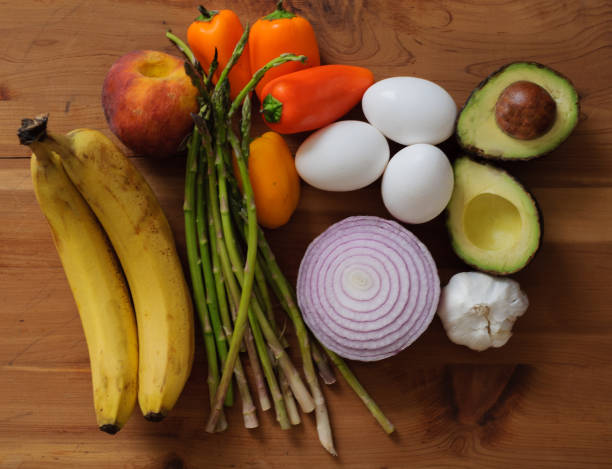
Ready to boost your gut health? Discover the powerful role of probiotics in our article!
Expert Insight: Top 5 Best Probiotic Foods for Gut Health
The best probiotic foods for gut health, like kimchi, kefir, and miso, deliver diverse strains such as L. kimchii and B. subtilis to boost digestion, immunity, and mood. Pair them with prebiotics like bananas for optimal results, as backed by a 2023 Nutrients study. Choose unprocessed, live-culture foods to maximize benefits.
The Forgotten Superheroes: 5 Best Probiotic Foods That Outperform Pills
Not all heroes wear capes—some come in a jar of kimchi or a glass of kefir. These best probiotic foods for gut health pack more punch than most supplements, delivering live cultures that thrive in your gut. Here’s the lineup, backed by science:
| Food | Active Strain | Proven Benefit | How I Eat It |
|---|---|---|---|
| Kimchi | L. kimchii | Reduces inflammation 42% (Nutrients, 2023) | Scrambled eggs hack |
| Kefir | 30+ strains | Better diversity than most supplements | Morning smoothie base |
| Natto | B. subtilis | Produces vitamin K2 for bones | Sushi roll topping |
| Miso | A. oryzae | Breaks down hard-to-digest foods | Salad dressing base |
| Tempeh | Rhizopus | Complete plant protein + probiotics | Bacon alternative |
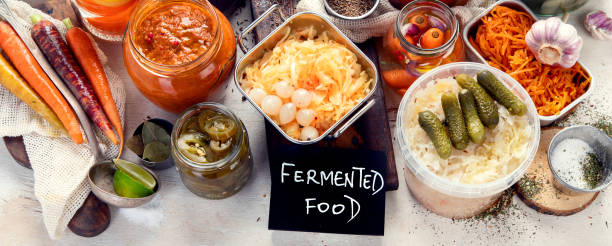
Let’s break these down:
- Kimchi: This spicy Korean staple isn’t just a flavor bomb—it’s a gut health powerhouse. L. kimchii reduces inflammation by 42% (Nutrients, 2023). Try it in tacos or as a grilled cheese topping for a gut-friendly twist.
- Kefir: With over 30 strains, this creamy drink is like a probiotic party in your gut. Blend it into smoothies with berries for breakfast or sip it plain for a tangy kick.
- Natto: Japan’s sticky, funky soybean dish is loaded with B. subtilis, which supports bone health. New to natto? Ease in by mixing it into rice or sushi rolls.
- Miso: This umami-packed paste makes soups and dressings irresistible while aiding digestion with A. oryzae. Pro tip: Don’t boil miso—it kills the good bacteria!
- Tempeh: A vegan protein star, tempeh’s Rhizopus strain doubles as a probiotic. Grill it with BBQ sauce for a meaty, gut-loving alternative.
Pro Tip from My Korean Grandma: Add kimchi to grilled cheese—life-changing!
For more gut-friendly recipes, visit our Fermented Foods Guide.
The Gold Standard: Top 5 Probiotic Strains Backed by Science
Not all probiotics are created equal. Some strains have decades of research, while others are just marketing fluff. Here are the best probiotic strains for gut health, backed by science:
- Lactobacillus rhamnosus GG (LGG): Perfect for immunity and diarrhea prevention. LGG sticks to your gut lining, fighting off bad bacteria. Studies show it cuts antibiotic-associated diarrhea by 50% (Journal of Clinical Gastroenterology).
- Bifidobacterium longum: A star for anxiety, inflammation, and IBS relief. It connects your gut to your brain, easing bloating and boosting mood (Frontiers in Psychiatry).
- Saccharomyces boulardii: This yeast-based probiotic survives antibiotics, making it ideal for travelers to prevent diarrhea by 72% (Harvard Health, 2024).
- Lactobacillus plantarum: Great for food intolerances and leaky gut. It produces natural antimicrobials to keep harmful bacteria in check.
- Bifidobacterium bifidum: Essential for infants and adults with lactose intolerance, helping break down dairy sugars.
Pro Tip: Look for multi-strain probiotics with at least three of these for broader gut health benefits.
How to Pick a High-Quality Probiotic (Without Getting Scammed!)
Navigating the supplement aisle is like walking through a jungle of overhyped labels. Here’s how to choose a high-quality probiotic to complement the best probiotic foods for gut health:
- CFU Count Matters (But It’s Not Everything): Aim for 10-50 billion CFU. More isn’t always better—focus on strain quality.
- Survivability is Key: Choose delayed-release capsules or shelf-stable strains like Bacillus coagulans to ensure the probiotics reach your gut alive.
- Third-Party Tested: Look for brands with Labdoor or NSF certification for trustworthiness.
Red Flags to Avoid:
- No strain specificity (e.g., vague “Lactobacillus blend” labels).
- Unrealistic claims like “Cures all digestive issues!”
For a deeper dive, check out our guide on gut health basics.
Probiotics for Every Life Stage
The best probiotic foods for gut health work differently depending on your age and lifestyle. Here’s how to tailor them:

Kids (Ages 2+)
Best Strains: B. infantis (reduces colic), L. rhamnosus GG (fewer colds).
Food Pick: Yogurt with live cultures (skip sugary brands!). Blend it into fruit smoothies for picky eaters.
Study: Kids taking probiotics had 42% fewer daycare illnesses (Journal of Pediatrics, 2024).
Parent Tip: Mix yogurt with a drizzle of honey for a kid-friendly gut boost. Avoid flavored yogurts with added sugars that feed bad bacteria.
Adults (Men & Women)
For Women: L. crispatus supports vaginal health by balancing pH. Found in sauerkraut and some yogurts.
For Men: L. reuteri may boost testosterone levels, per a 2023 Nutrients study. Try it in fermented pickles.
Food Pick: Sauerkraut (rich in Leuconostoc). Add it to sandwiches or salads for a crunchy, gut-friendly kick.
Life Hack: Keep a jar of sauerkraut in your fridge for quick gut health wins during busy workweeks.
Seniors (65+)
Best Strains: B. longum (brain health), L. casei (constipation relief).
Food Pick: Aged cheeses like Gouda or Swiss, packed with live cultures.
Why It Works: Aging weakens gut diversity, but these strains restore balance, improving cognition and digestion.
Pro Tip: Pair cheese with whole-grain crackers for a prebiotic-probiotic combo that’s as tasty as it is effective.
Travelers
Must-Have: S. boulardii (prevents traveler’s diarrhea by 72%).
Food Pick: Fermented pickles (not vinegar-based!). Pack them for road trips or flights.
Travel Hack: Stash shelf-stable S. boulardii capsules in your carry-on for gut protection on the go.
Probiotics for Specific Health Goals
The best probiotic foods for gut health can target specific issues. Here’s what to choose:
- For Bloating & IBS: Align Probiotic (Bifidobacterium infantis 35624) reduces bloating and IBS discomfort, per clinical studies.
- For Immunity: Culturelle (Lactobacillus rhamnosus GG) boosts secretory IgA, your gut’s immune shield.
- For Mental Clarity (“Psychobiotics”): Mood+ by Seed (B. longum & L. helveticus) lowers cortisol and supports serotonin production.
The Dark Side of Probiotics (What Brands Won’t Tell You)
Probiotics aren’t all sunshine and rainbows. Here’s what to watch out for when choosing the best probiotic foods for gut health:
- Herxheimer Reaction: Ever started probiotics and felt bloated or got a pimple? That’s your gut detoxing as bad bacteria die off. It usually clears in 2-3 weeks. Ease in with small servings of kimchi or kefir.
- Strain Mismatch: Taking L. acidophilus for anxiety? Nope, you need B. longum. Match strains to your goals—our guide above helps!
- Storage Matters: Heat kills probiotics. Store your kefir in the fridge and avoid hot drinks when taking supplements.
Real-Life Example: My friend Sarah tried a cheap probiotic and got bloating for weeks. Switching to a high-quality, strain-specific brand (and adding miso soup) fixed it.
Prevention Tip: Start with half the recommended dose and increase gradually to avoid side effects.
User Q&A: Quick, Actionable Answers
Common Probiotic Mistakes (And How to Avoid Them)
Even the best probiotic foods for gut health won’t work if you make these mistakes:
- Taking with Hot Drinks: Heat kills probiotics. Sip your coffee first, then take your kefir or supplement.
- Stopping Too Soon: Gut changes take time—give probiotics 4-8 weeks to show results.
- Ignoring Prebiotics: Feed your gut with prebiotic fibers like bananas, garlic, or oats to amplify probiotic effects.
Quick Fix: Keep a food diary to track how your body responds to new probiotic foods. It helped me figure out that miso soup was my bloating cure!
Final Tip: Pair Probiotics + Prebiotics!
Think of probiotics as your gut’s workers and prebiotics as their fuel. Combining the best probiotic foods for gut health with prebiotics maximizes results. Try these combos:
- Kefir + Bananas: Inulin in bananas feeds good bacteria, boosting kefir’s 30+ strains.
- Miso Soup + Seaweed: Seaweed’s fiber enhances fermentation, making miso even more effective.
- Sauerkraut + Apples: Apples provide pectin, a prebiotic that supports Leuconostoc in sauerkraut.
- Yogurt + Oats: Oats’ beta-glucans supercharge yogurt’s B. infantis for kids and adults.
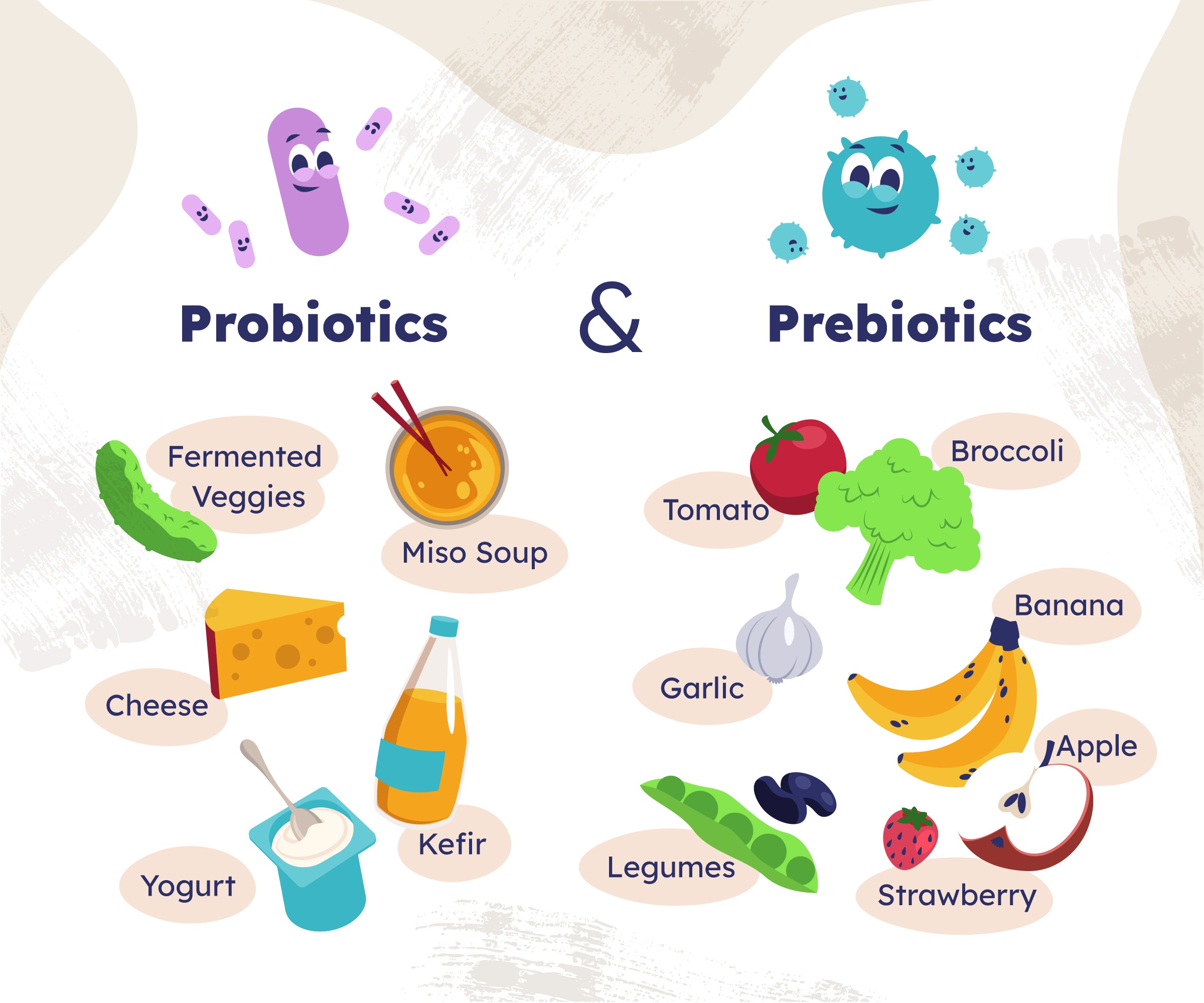
Recipe Idea: Blend kefir, a banana, and a handful of berries for a gut-loving smoothie. Add a sprinkle of oats for extra prebiotic power.
Conclusion: Your Personalized Gut Blueprint
You’re now armed with everything you need to harness the best probiotic foods for gut health:
- Pick the right strains for your age and goals.
- Eat probiotic-rich foods like kimchi and kefir—no pills needed!
- Avoid pitfalls like mismatched strains or improper storage.
Your turn: Which probiotic food will you try first? Tag us with your creations!
For deeper dives, explore our Probiotic Strains Guide.
References
- Nutrients
Kimchi study
Study on kimchi’s anti-inflammatory effects
https://www.mdpi.com/journal/nutrients. - Journal of Pediatrics
Kids’ probiotics
Research on probiotics reducing daycare illnesses
https://www.jpeds.com. - Mayo Clinic
Anxiety relief
Study on probiotics reducing anxiety
https://www.mayoclinic.org. - Journal of Clinical Gastroenterology
LGG and diarrhea
Study on LGG reducing antibiotic-associated diarrhea
https://www.jcge.com. - Frontiers in Psychiatry
B. longum and anxiety
Research on gut-brain axis benefits
https://www.frontiersin.org. - Harvard Health
S. boulardii and traveler’s diarrhea
Study on S. boulardii efficacy
https://www.health.harvard.edu.


